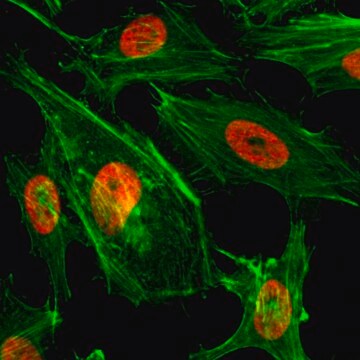SAB5200921
Monoclonal Anti-Notch1 - Percp antibody produced in mouse
clone S253-32, purified immunoglobulin
Sinonimo/i:
Anti-Motch, Anti-Neurogenic locus notch homolog protein 1, Anti-Neurogenic locus notch protein homolog, Anti-TAN1
About This Item
Prodotti consigliati
Origine biologica
mouse
Livello qualitativo
Coniugato
Peridinin-Chlorophyll-Protein Complex
Forma dell’anticorpo
purified immunoglobulin
Tipo di anticorpo
primary antibodies
Clone
S253-32, monoclonal
Forma fisica
buffered aqueous solution
PM
antigen predicted mol wt >270, ~120 kDa
Reattività contro le specie
mouse, rat, human
Concentrazione
1 mg/mL
tecniche
immunocytochemistry: suitable
western blot: suitable
Isotipo
IgG1
N° accesso NCBI
N° accesso UniProt
Condizioni di spedizione
wet ice
Temperatura di conservazione
−20°C
modifica post-traduzionali bersaglio
unmodified
Informazioni sul gene
mouse ... Notch1(18128)
Descrizione generale
Immunogeno
Azioni biochim/fisiol
Caratteristiche e vantaggi
Stato fisico
Esclusione di responsabilità
Non trovi il prodotto giusto?
Prova il nostro Motore di ricerca dei prodotti.
Codice della classe di stoccaggio
10 - Combustible liquids
Classe di pericolosità dell'acqua (WGK)
WGK 1
Punto d’infiammabilità (°F)
Not applicable
Punto d’infiammabilità (°C)
Not applicable
Certificati d'analisi (COA)
Cerca il Certificati d'analisi (COA) digitando il numero di lotto/batch corrispondente. I numeri di lotto o di batch sono stampati sull'etichetta dei prodotti dopo la parola ‘Lotto’ o ‘Batch’.
Possiedi già questo prodotto?
I documenti relativi ai prodotti acquistati recentemente sono disponibili nell’Archivio dei documenti.
Il team dei nostri ricercatori vanta grande esperienza in tutte le aree della ricerca quali Life Science, scienza dei materiali, sintesi chimica, cromatografia, discipline analitiche, ecc..
Contatta l'Assistenza Tecnica.